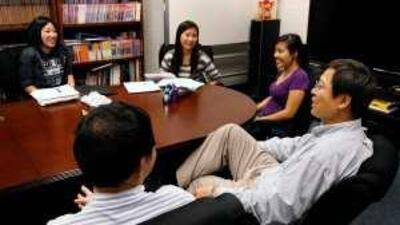BEIJING // While China is often seen as the centre for the production of cheap and sometimes poor quality goods, there are certain other exports the world's most populous nation hopes will endure: language and culture. Starting in 2004, the country has opened hundreds of Confucius Institutes around the world, usually based in universities, where people can learn the Chinese language.
Currently there are 282 Confucius Institutes in 88 countries, along with 272 smaller-scale classrooms, and many more are planned, with the government reportedly looking to have 1,000 open by 2020. Their worldwide expansion has been seen as part of a move to spread "soft power" or global influence, based upon the ideas of the American academic Joseph Nye. Xue Qing Guo, a professor and vice dean at the Arabic department of Beijing Foreign Studies University, which is likely to partner with Zayed University to launch a Confucius Institute in Abu Dhabi next year, said the aim of the centres was to "enhance mutual understanding" between Chinese people and foreigners.
"China is not the only nation to build soft power," he said. "Germany has the Goethe-Instituts and Spain has the Instituto Cervantes. There's the British Council." The Confucius Institutes could, Prof Xue said, promote trade as well as culture, by encouraging people to buy Chinese commodities. The opening of so many Confucius Institutes has not been without controversy. Jocelyn Chey, a visiting professor at the University of Sydney and a former diplomat, wrote in a 2007 paper that universities that opened Confucius Institutes risked compromising the academic integrity of their research. The centres could "produce propaganda", she wrote.
Ms Chey told The National she still saw the Confucius Institute "movement" as inspired by the notion of soft power and the regime's idea of China's "peaceful rise", in which the country would gain influence without appearing to be a political, military or economic threat. However, she said Confucius Institutes varied, with some having cultural roles and even promoting scientific research and collaborations with Chinese universities.
"There is no fixed model and I would judge that the Chinese government is still reviewing and revising the way in which they work," she said. Her fears that the University of Sydney could compromise its academic independence by setting up a Confucius Institute have been allayed, she said, by not handing over core teaching and research to the centre. Indeed Michael Szonyi, the professor of Chinese history at Harvard University, said globally there has been "little direct evidence" of the institutes becoming "a vehicle for political influence or interference", although there was "no doubt" the Chinese government saw them as a way of spreading soft power.
"It is an indication of the curious combination of sophistication and clumsiness that characterises China's foreign diplomacy that by throwing money at Chinese language training, the Confucius Institutes are seen as a way to make China's way of life seem more attractive to people around the world," he said. Some do still see a strong political undercurrent. Ding Xueliang, professor of social science at Hong Kong University of Science and Technology, said that with the Confucius Institutes, "the top priority is political".
"The government objective [is] top of the list," he said. "The political objective is dressed as cultural. Beijing wants to improve the communist party's international credibility ? so government policy becomes less criticised by international bodies. "The central leadership feels badly when the Chinese government becomes attractive to international criticism." Officials insist the Confucius Institutes are not about spreading soft power. Hu Zhiping, the deputy director general of Hanban, the government language organisation that runs the institutes, said the aims were to help foreigners learn Chinese, introduce Chinese culture to the wider world and, through this, to "promote mutual understanding and friendship".
"You cannot find any trace of this soft power promotion," he said at the organisation's Beijing headquarters. "We are just promoting language and cultural understanding." China, he said, had benefited from learning the languages of other cultures, so the country now wanted to aid foreign countries by helping them to learn Chinese. "Because of this commitment [Confucius Institutes] have succeeded both in western countries and also in Latin American countries and African countries," he said.
There has been "huge demand", he said, from overseas organisations wanting to open Confucius Institutes. "We hope the Chinese language in 20 or 30 years' time will be a widely accepted language and can serve as an international language," Mr Hu said. "I will be glad if, in the future, when Chinese people go to foreign countries, they will not encounter a language barrier and people can understand us well."
dbardsley@thenational.ae


